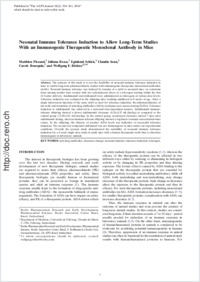Neonatal immune tolerance induction to allow long-term studies with an immunogenic therapeutic monoclonal antibody in mice
- Piccand, Matthieu Roche Pharmaceutical Research and Early Development, Pharmaceutical Sciences, Roche Innovation Center Basel, Switzerland
- Bessa, Juliana Roche Pharmaceutical Research and Early Development, Pharmaceutical Sciences, Roche Innovation Center Basel, Switzerland
- Schick, Eginhard Roche Pharmaceutical Research and Early Development, Pharmaceutical Sciences, Roche Innovation Center Basel, Switzerland
- Senn, Claudia Roche Pharmaceutical Research and Early Development, Pharmaceutical Sciences, Roche Innovation Center Basel, Switzerland
- Bourquin, Carole Department of Medicine, Université de Fribourg, Switzerland
- Richter, Wolfgang F. Roche Pharmaceutical Research and Early Development, Pharmaceutical Sciences, Roche Innovation Center Basel, Switzerland - F. Hoffmann-La Roche Ltd., Basel, Switzerland
-
24.11.2015
Published in:
- The AAPS Journal. - 2016, vol. 18, no. 2, p. 354–361
English
The purpose of this study is to test the feasibility of neonatal immune tolerance induction in mice to enable long-term pharmacokinetic studies with immunogenic therapeutic monoclonal antibodies (mAb). Neonatal immune tolerance was induced by transfer of a mAb to neonatal mice via colostrum from nursing mother mice treated with two subcutaneous doses of a tolerogen starting within the first 24 h after delivery. Adalimumab and efalizumab were administered as tolerogens at various dose levels. Tolerance induction was evaluated in the offspring after reaching adulthood at 8 weeks of age. After a single intravenous injection of the same mAb as used for tolerance induction, the pharmacokinetics of the mAb and formation of anti-drug antibodies (ADA) in plasma were assessed using ELISA. Tolerance induction to adalimumab was achieved in a maternal dose-dependent manner. Adalimumab immune-tolerant offspring showed a slower adalimumab clearance (4.24 ± 0.32 mL/day/kg) as compared to the control group (12.09 ± 3.81 mL/day/kg). In the control group, accelerated clearance started 7 days after adalimumab dosing, whereas immune- tolerant offspring showed a log-linear terminal concentration-time course. In the offspring, the absence of predose ADA levels was indicative of successful tolerance induction. The second test compound efalizumab was not immunogenic in mice under our experimental conditions. Overall, the present study demonstrated the suitability of neonatal immune tolerance induction for a 4-week single dose study in adult mice with a human therapeutic mAb that is otherwise immunogenic in laboratory animals.
- Faculty
- Faculté des sciences et de médecine
- Department
- Département de Médecine
- Language
-
- English
- Classification
- Biological sciences
- License
-
License undefined
- Identifiers
-
- RERO DOC 259485
- DOI 10.1208/s12248-015-9850-5
- Persistent URL
- https://folia.unifr.ch/unifr/documents/304977
Statistics
Document views: 84
File downloads:
- pdf: 150
